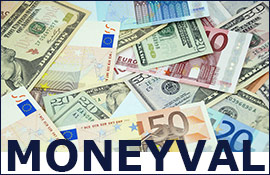MONEYVAL in brief
The context
The Committee of Experts on the Evaluation of Anti-Money Laundering Measures and the Financing of Terrorism - MONEYVAL is a permanent monitoring body of the Council of Europe entrusted with the task of assessing compliance with the principal international standards to counter money laundering and the financing of terrorism and the effectiveness of their implementation, as well as with the task of making recommendations to national authorities in respect of necessary improvements to their systems. Through a dynamic process of mutual evaluations, peer review and regular follow-up of its reports, MONEYVAL aims to improve the capacities of national authorities to fight money laundering and the financing of terrorism more effectively.
MONEYVAL (formerly PC-R-EV) was established in 1997 and its functioning was regulated by the general provisions of Resolution Res(2005)47 on committees and subordinate bodies, their terms of reference and working methods . At their meeting on 13 October 2010, the Committee of Ministers adopted the Resolution CM/Res(2010)12 on the Statute of the Committee of Experts on the Evaluation of Anti-Money Laundering Measures and the Financing of Terrorism (MONEYVAL) . The statute elevates MONEYVAL as from 1 January 2011 to an independent monitoring mechanism within the Council of Europe answerable directly to the Committee of Ministers. MONEYVAL Statute was further amended in 2013 by the Resolution CM/Res(2013)13.
Objectives
The aim of MONEYVAL is to ensure that its member states have in place effective systems to counter money laundering and terrorist financing and comply with the relevant international standards in this matter.
In order to achieve this goal, MONEYVAL is vested with a number of key competencies and tasks. It shall:
- assess its members' compliance with all relevant international standards in the legal, financial and law enforcement sectors through a peer review process of mutual evaluations, including assessment of effectiveness of the implemented measures in practice;
- formulate recommendations on ways to improve the effectiveness of domestic regimes to combat money laundering and terrorist financing and states’ capacities to co-operate internationally in these areas;
- conduct thematic typologies research of money laundering and terrorist financing methods, trends and techniques and issue reports thereabout;
- conduct other research into issues relating to money laundering and the financing of terrorism, including horizontal reviews of the progress of evaluated States in meeting the international standards in each evaluation round;
- undertake activities to raise awareness of major global policy and operational initiatives to counter money laundering and the financing of terrorism;
- after consultation with the European Committee on Crime Problems (CDPC), propose recommendations for adoption by the Committee of Ministers which would improve the international fight against money laundering and the financing of terrorism;
- contribute actively to the global fight against money laundering and the financing of terrorism by working closely with other key international partners, including the FATF, the IMF, the World Bank, the United Nations, the European Union and other FATF-Style Regional Bodies (FSRBs) in the global network of AML/CFT assessment bodies.
Relevant Council of Europe websites
Conference of the Parties (COP) to the CETS 198



